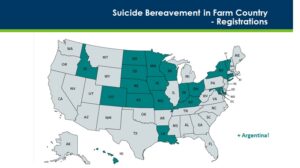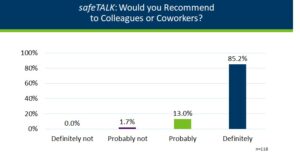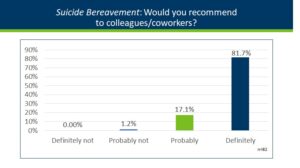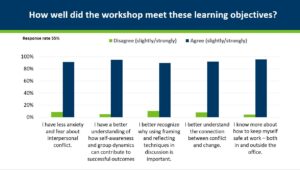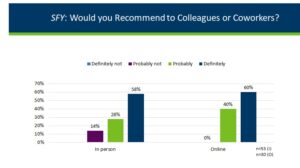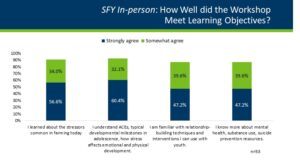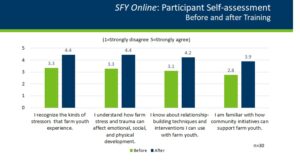Final report for ENC18-170
Project Information
This project developed materials and delivered training about several important farmer stress and mental health topics to Federal agency staff, State regulatory staff, Extension, lenders, clergy, social organizations, business people, and others. Advisory group members and contractors developed three original workshops or seminars: Supporting Farm Youth in Stress, Navigating Conflict and Tough Conversations in Agriculture, and Suicide Bereavement in Farm Country. We also created an agricultural adaptation for a proven suicide intervention training called safeTALK: Preventing Suicide in Agricultural Communities. Finally, we refined a workshop called Down on the Farm: Supporting Farmers in Stressful Times and created materials to help people in and in and beyond Minnesota adapt and deliver it themselves. This project was led by the Minnesota Department of Agriculture with collaborators AgCentric Minnesota State Agricultural Center of Excellence at Central Lakes College and the Minnesota Department of Health. Other partners included Minnesota Department Human Services, USDA Farm Service Agency (Minnesota), and SAVE – Suicide Awareness Voices of Education, and University of Minnesota Extension. We expected this project would reach at least 400 agricultural advisors, educators, and other professionals. Instead, it reached nearly 1,500.
OUTCOMES
Response to this project exceeded our own expectations.
Planned: 150 agricultural professionals who understand the nature of suicide, can recognize people at risk, and know how to intervene to prevent their completing the act. (25 per location)
Actual: 233 individuals who learned suicide alertness skills at one of six safeTALK: Preventing Suicide in Agricultural Communities trainings and 252 individuals who explored suicide's aftermath in a webinar called Suicide Bereavement in Farm Country.
Planned: 150 agricultural professionals who understand and have practiced conflict resolution and de-escalation skills (25 per location)
Actual: 685 individuals who learned ways to navigate conflict and difficult conversations in and about agriculture by attending in-person or online workshops.
Planned: 100 individuals who work with farm youth are aware of how stress manifests itself in farm and rural adolescents and can intervene to help when they recognize signs and symptoms in youth they know (30 per location).
Actual: 310+ individuals who work with farm youth are aware of how stress manifests itself in farm and rural adolescents and can intervene to help when they recognize its signs and symptoms.
Planned: One replicable curriculum available for groups and individuals who want to deliver Down on the Farm: Supporting Farmers in Stressful Times within their organization or community - in person, or online.
Actual: A slide set and facilitator’s guide for Down on the Farm: Supporting Farmers in Stressful Times with tips on adapting adapting and using the workshop materials for in-person or on-line delivery.
(Note: Many people attended more than one workshop. For example, we promoted the Suicide Bereavement webinar to people who had attended our safeTALK: Preventing Suicide in Agricultural Communities sessions and promoted the online version of Navigating Conflict to all the in-person attendees because so many of them told us they would recommend the course to a colleague or co-worker.)
The genesis of this project was attendee feedback from a 2018 workshop called Down on the Farm: Supporting Farmers in Stressful Times that the MDA created with several partners and offered at six Minnesota locations, reaching more than 500 agricultural professionals. Afterwards, we kept getting requests to offer more sessions and wanted other groups to be able to offer the workshop themselves -- in their own communities. We were also motivated to build on it: from workshop evaluations, knew that agricultural advisors particularly wanted more information and skill building in suicide (including prevention and suicide's aftermath), conflict resolution, de-escalation, and farm youth issues. Initially, we intended to incorporate some of the workshops into existing professional meetings, but apart from two or three sessions of Supporting Farm Youth in Stress, they were all held as stand-alone events.
Cooperators
- (Educator)
- (Educator)
- (Educator)
- (Educator)
- (Educator)
- (Educator)
Education
Our project 1) developed adaptable workshop materials to teach agriculture professionals and others in rural communities how to recognize and respond to farmer and farm families in distress; 2) developed and delivered four lecture-based and interactive knowledge and skill-building workshops, each offered multiple times. Early on we planned to explore the use of computer-based distance learning but then gravitated toward offering in-person workshops in multiple locations across Minnesota in order to reduce attendee time and travel while promoting interaction. However, distance learning became imperative in 2020, once it was clear that the COVID-19 pandemic had made in-person events impossible. We offered two workshops and one seminar online in 2020 and adapted the Down on the Farm workshop materials so they could be used for online delivery.
Education & Outreach Initiatives
Develop an adaptable curriculum to teach people who work with farmers how to recognize and respond to farmers or farm family members in distress.
After offering Down on the Farm: Supporting Farmers in Stressful Times (DOTF) six times in 2018, we kept getting requests to offer it in additional places and for specific groups. Our delivery team (one staff person each from the MDA, Farm Service Agency-MN, and Minnesota Sheriffs' Association plus Minnesota's sole publicly funded traveling mental health specialist who focuses on farmers) was not sustainable. We set out to create an educational program that other groups and organizations could freely adapt and use. Workshop topics include factors that contribute to stress, signs and symptoms of stress, active listening, personal safety, and identifying community resources. We anticipate Extension, Farm Business Management and other adult educators, farm and commodity groups, nonprofit organizations, others in agribusiness, and law enforcement or social service professional skilled in crisis management and de-escalation could collaborate to deliver the program. We expect attendees will include include farm advisors, state and federal agency staff, lenders, clergy, veterinarians, agribusiness and other rural business people.
Key individuals at our collaborator, AgCentric Minnesota State Agricultural Center of Excellence at Central Lakes College, worked on turning the Down on the Farm: Supporting Farmers in Stressful Times into a replicable program, drawing on the original workshop and informed by other approaches and materials from Michigan State University Extension and North Dakota State University Extension, for example. AgCentric produced drafts of both a PowerPoint slide set and a facilitator's guide.
The MDA continued work on the draft, incorporating suggestions from the workshop originators. Initially, there was a tacit assumption that we were creating materials for use in Minnesota, but as the project evolved, we realized that people in other parts of the United States might find it helpful, so we added tips and encouragement to adapt the materials for their audiences. We also suggested ways to update information like financial data so that the materials can naturally evolve without having to be re-written.
After the pandemic hit in March, we hit "pause" for long time, knowing that nobody would use our materials for an the in-person workshops we had in mind, even if they wanted to. As the year wore on, it became more and more clear that distance learning is likely to have a permanent place in our culture, even after the United States someday goes back to "normal."
After an online adaptation of the Navigating Conflict and Difficult Conversations in Agriculture workshop (see below) was extremely attended and received, we felt more optimistic about DOTF's immediate future. We decided to turn the workshop into an either/or hybrid, and included delivery suggestions for offering it online as well as in-person.
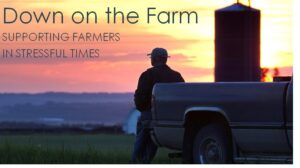 The slide set and facilitator's guide package has been through accessibility review and is ready for distribution. We ran into an unanticipated challenge about how to make the materials easily available for anyone to download and use. The files are enormous and can't be e-mailed. Plus, we think people will be more likely to pick them up and look them over, as it were, if they don't have to request access via a file sharing program. We are working with our information technology gatekeepers on how to offer the materials conveniently. In the meantime, we will encourage colleagues in Virginia and Illinois to review and test the materials. We are committed to making these materials available for free and to permitting (and even encouraging) users to modify them so the workshop is most appropriate and meaningful for their audiences.
The slide set and facilitator's guide package has been through accessibility review and is ready for distribution. We ran into an unanticipated challenge about how to make the materials easily available for anyone to download and use. The files are enormous and can't be e-mailed. Plus, we think people will be more likely to pick them up and look them over, as it were, if they don't have to request access via a file sharing program. We are working with our information technology gatekeepers on how to offer the materials conveniently. In the meantime, we will encourage colleagues in Virginia and Illinois to review and test the materials. We are committed to making these materials available for free and to permitting (and even encouraging) users to modify them so the workshop is most appropriate and meaningful for their audiences.
Teach agricultural community members to prevent suicide by teaching them suicide alertness and bereavement skills
2019 - Prevention
With partners at Minnesota Department of Health, SAVE, and LivingWorks, we adapted an evidence and skills-based suicide prevention training called safeTALK to address the unique characteristics of agricultural communities. We initially offered the training, called safeTALK: Preventing Suicide in Agricultural Communities in six rural locations across Minnesota. They filled quickly, so we added three more sessions. A total of 233 agricultural and rural professionals – agency staff, lenders, clergy, lenders, agribusiness, social service providers attended this training.
We solicited evaluation feedback via SurveyMonkey approximately 24 hours after each event. The overall evaluation response rate was 51%.
2020 - Bereavement
Our safeTALK: Preventing Suicide in Agricultural Communities training was not suitable to adapt for online delivery during the COVID pandemic. However, we knew from the response to the safeTALK sessions and demands for additional training that the community was hungry for more opportunities to explore the topic of suicide. This time, we decided to focus on what comes after a suicide: bereavement. The MDH agreed to partner with MDA, and we worked with nationally known suicide prevention expert Dan Reidenberg, Psy.D. (Dan is also the Executive Director of SAVE, which collaborated on the agricultural contextualization for safeTALK in 2019.)
The result was Suicide Bereavement in Farm Country, an hour-long webinar in which Dan explored the characteristics of suicide grief, and the unique considerations for farm and rural residents who are affected by a family or community member's suicide. After the success of offering Navigating Conflict online (see below), we promoted Suicide Bereavement in Farm Country to safeTALK alumni as well as our traditional agricultural partner organizations and via organizations like the National Association of State Departments of Agriculture and North Central SARE. A total of 252 people from 21 states attended either the "live" webinar or at a re-play we offered a week later, and 82 of them (33%) completed an online evaluation survey.
After safeTALK, 98% of respondents said they would probably or definitely recommend the workshop to colleagues and coworkers.
About 85% identified at least one act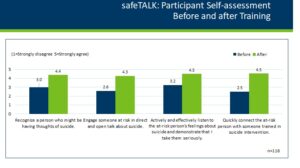 ion they planned to take as a result of attending, most neatly tied to learning objectives for the course. The most frequently mentioned was encouraging encourage others to learn about suicide alertness. Other common responses included paying attention to warning signs and being more direct and forthright when talking to someone at risk, as well as compiling, keeping handy, and sharing contact information for local crisis resources. More than one person has told us that since the training they have done a suicide intervention. In fact, one person did and intervention between the training and the time they filled out the online evaluation.
ion they planned to take as a result of attending, most neatly tied to learning objectives for the course. The most frequently mentioned was encouraging encourage others to learn about suicide alertness. Other common responses included paying attention to warning signs and being more direct and forthright when talking to someone at risk, as well as compiling, keeping handy, and sharing contact information for local crisis resources. More than one person has told us that since the training they have done a suicide intervention. In fact, one person did and intervention between the training and the time they filled out the online evaluation.
In light of the fact that there was such strong interest in more training, Glen Bloomstorm and the MDH taught more than five additional safeTALK trainers to deliver the agricultural adaptation we created as part of our SARE grant. In early 2020, we offered $500 sponsorships to encourage organizations that want to coordinate a safeTALK: Preventing Suicide in Agricultural Communities session for farmers, farm family members, and professionals who work with or support them. Due to how rapidly the pandemic portcullis slammed shut, making training impossible, we only sponsored one event. However, the MDA intends to continue sponsor community-based trainings as funds are available.
The response to Bereavement was overwhelming: 99% of evaluation respondents said they would recommend this workshop to others. (99%!)
On the evaluation survey, many people told us they had never considered the difference between reactions to suicide in rural areas, where everyone knows everyone else, compared to urban areas, where people be relatively anonymous. Many had never considered the fact that since farm suicides often take place on the farm property, some families have to pass the place of death every day. Some commented that the workshop taught them how important language is in talking to the bereaved, and many said they learned new ways they could (helpfully) support people grieving a suicide.
Participants learn to prepare for and approach potentially adverse interactions in ways that lead to better outcomes for everyone involved, and learn precautions to stay safe in highly charged situations
2019
The MDA contracted with U of M Extension Center for Community Vitality to develop and deliver a 3-hour workshop that explores the ways stressful times in agriculture trigger bad news and difficult conversations. Leadership & Civic Engagement educator Denise Stromme facilitated the workshop at six Minnesota locations in Summer 2019, reaching more than 245 attendees. The target audience included lenders, mediators, agency staff, clergy, educators, farmers, veterinarians, social service providers, and other farm advisors and rural businesspeople.
We solicited evaluation feedback via SurveyMonkey approximately 24 hours after each event. The overall evaluation response rate was 56%.
2020
In 2020 , Denise agreed to reimagine and reformat the course for online delivery. She created a series of five highly interactive sessions delivered for 30 minutes each morning over five days using Zoom. We divided the course into topics by day: Monday - Bring your best self forward; Tuesday - Embrace conflict and change; Wednesday - Name and frame the conversation ; Thursday - Listen for success; Friday - Be safe: de-escalation and personal safety (rural deputy sheriff co-presenter)
The 2019 in-person sessions received high “would recommend to colleagues and co-workers” scores, so we targeted those attendees when we began to promote the online version. In addition, we promoted to agriculture and agency partners in Minnesota and via traditional and social media. Denise shared information through her Extension networks, and the North Central SARE office pushed the announcement out to state coordinators in the region. It was fun to see the news spread as registrations from more and more states rolled in.
A total of 440 people from 19 states and two Canadian provinces attended the online workshop for at least one session. Attendance was highest for the first session (357), but we still had 226 people hanging in there by Friday! The most frequent professions represented were educators (Extension, Farm Business Management, etc.), followed by agency staff, and farmers. Evaluation response rate for online course was 37%.
After the 2019 workshops, Denise said, "As the instructor, I felt that many of the participants did not expect the focus to be on them and how they can prepare themselves for conflict and difficult conversations. That being said, the participants were engaged in the content and activities and the energy was positive, which was important for such a somber topic."
During the online course, she encouraged participation using different interactive tools like Padlet, Mentimeter, and Chatterfall She had several Extension colleagues working unobtrusively behind the scenes ; they ensured that the technologies all worked together elegantly and effectively.
Evaluations indicated a high levels of satisfaction with both content and delivery and that both the in-person and online workshiops were
After the online course, some people reported they had difficulties with the technology, didn’t like the format, or didn’t find this workshop’s focus on the self – rather than the situation – helpful. However, many respondents were enthusiastic about the content, the bite-sized daily format, and the interactive activities Denise embedded so participants could express themselves and not just listen.
Several people commented that they wish they’d learned some of the techniques and approaches earlier in their careers:
I feel as though… professionals required to do compliance work typically do not have the background to appropriately handle conflict and deescalate situations and believe that programs like these are extremely beneficial. […] Also the safety tips on the last day were also great, I never would have thought to just meet with local police to get to know them better and establish a working relationship. Again, I wish I would have been offered a training like this years ago, but will still be able to take away many useful things. Thank you for offering this program!
But maybe the greatest satisfaction comes from people who say talk about sharing what they learned with colleagues or co-workers, like this:
I shared this webinar with my entire local health department and our entire food policy council. Invaluable resource with great practical tips and wonderful exercises. Cannot say enough good things. Although a lot of the information is "common sense" in retrospect, it's a topic we don't break down and think about. This webinar series was so well done and easy to understand and I feel like I have some GREAT new skills to hone. Thank you!
We received several comments from people who were disappointed at the lack of the online course presenters' racial and other diversity. Both Denise and the deputy sheriff who presented the safety session are White women (or appear to be, anyway). These were constructive and understandable comments, particularly from regions and cultures where farmers may be ethnically and racially very substantially different.
Orient adults who work with youth to the stressors unique to growing up on a farm and equip attendees to support adolescents in stress.
We contracted with licensed professional counselor Monica Kramer McConkey to develop and deliver a two hour workshop called Supporting Farm Youth in Stress (SFY), followed immediately by a "QPR For Youth" suicide prevention workshop, for a total of three hours. Monica grew up on a farm and has strong professional background providing psychological services to youth but in developing this training found little research on farm youth specifically related to stress and mental health.
Monica delivered the workshop at five Minnesota locations in Summer and Fall 2019 to target audiences including teachers, school counselors, school administrators, 4-H leaders, FFA advisors, youth pastors, social workers, mental health professionals, health care professionals, others who work with farm youth.
We offered and evaluated two initial public sessions to pilot the training, which attracted 90 participants. Monica also delivered it under the aegis of this SARE-funded initiative in three more locations by request (Southeast Minnesota School Counselors Association, Minnesota Department of Human Services School-based Mental Health Conference and Minnesota Rural Education Association Conference. She since has delivered the program to other groups as well.
We solicited evaluation feedback from attendees at the first two workshops using SurveyMonkey approximately 24 hours after each event. The overall evaluation response rate was 42%.
In late 2020, the MDA contracted with Monica again to adapt SFY for online delivery, but without the QPR add-on. After observing the "one short chunk a day" model work well for Navigating Conflict, we did the same for SFY. She delivered the sessions during 45 minute sessions on four consecutive days. Like Navigating and Bereavement, the online SFY workshop attracted attendees from many states. A total of 220 people attended one or more of the online sessions. As happened with Navigating, the response rate to the online follow-up survey dropped substantially compared to the in-person course -- in this case to only 14%.
After both courses, survey respondents overwhelmingly said they would recommend the workshop to their peers.
Constructive feedback from in-person respondents was that the workshop felt rushed, while many of the online participants were frustrated about technology problems we all encountered using a WebEx platform. (The host and presenters have been even more upset about the problems.)
We used slightly different questions to assess how well the workshop had met its educational objectives:
The in-person participants most frequently intended to invest in relationships with adolescents as a result of the workshop. Others said they planned to listen more, and to both talk about stress and menntal health with students and/or share information with collagues. The QPR training, which was the last hour of the inperosn course, pompted many to say they planned to research crisis resources and have them at the ready,
From the first two in-person workshops, we also learned that participants comprised two basic groups, and it was a little challenging to meet their differing needs simultaneously. One basic group consisted of adults familiar with farming issues who wanted to know about mental health and adolescent development. The other consisted of mental health and social service providers who wanted to know more about the types of farm and agriculture issues and challenges that youth experience. Monica altered the workshop slightly with each training to be as relevant and useful as possible, and this information was very helpful to us in framing the online workshop for participants.
Answers to our "What is one action you plan to take or one thing you plan to do as a result of this course?" question elicited very similar response from online particpants. Some variation of "reach out to farm youth" was the most common response, followed by considering stress when developing programs and adding mental health information and education to existing efforts. The online course also elicited introspective comments from some participants about the stress they carry with them even now that had its roots in growing up on a farm, which has prompted us to think about about what we could do for "adult survivors of farm stress and trauma."
Educational & Outreach Activities
Participation Summary:
Learning Outcomes
Project Outcomes
Our project team and partners created a comprehensive effort that enhanced the stress and distress-related awareness, skills and abilities of nearly 1,500 professionals in and beyond Minnesota who work with farmers. We trained 233 people in suicide alertness, educated 252 people about how to be more understanding and supportive after a suicide, taught 210 people skills they can use to create supportive relationships and helped 685 people understand how their own approach and affect can influence situations that are at risk to become contentious or uncomfortable. In addition, we created four educational workshops and seminars that can continue be delivered beyond the audiences for which we created them (and in fact, some already have). We have similar great expectations for the reception and use of the Down on the Farm: Supporting Farmers in Troubled Times workshop materials that we are about to launch for public use.
safeTALK
There was such strong demand for safeTALK training that we added three workshops to the six originally planned, and could still not accommodate all who were waitlisted. Our partners Minnesota Department of Health and LivingWorks instructor Glen Bloomstrom convened a session to teach safeTALK instructors how do deliver the Preventing Suicide in Agricultural Communities model, so there are now eight instructors qualified to offer this tailored training instead of one. In addition, the Minnesota Department of Agriculture is offering funds to help sponsor additional trainings organized by local hosts in rural communities.
In addition, we have received unsolicited feedback from four safeTALK: Preventing Suicide in Agricultural Communities projects who have performed suicide interventions since training.
When the pandemic precluded our offering more safeTALK sessions (which must be conducted in-person) we shifted our focus on suicide and collaborated with partners to created a tremendously popular and well-received webinar about suicide bereavement and suicide's unique and pernicious stigma in farm and rural communities. Creator Dan Reidenberg is a frequent public speaker, and I anticipate that he will deliver this talk elsewhere or incorporate some of the content into other presentations.
Navigating Conflict
Creator/instructor Denise Stromme has delivered this workshop by request for two more groups - Farm Business Management instructors and Minnesota Pollution Control Agency Staff.
Legislative Hearings
PI Meg Moynihan described several components of this SARE PDP project in testimony to Minnesota House and Senate Agriculture committees in February 2020 (https://www.house.leg.state.mn.us/hjvid/91/892586) and February 2021.
